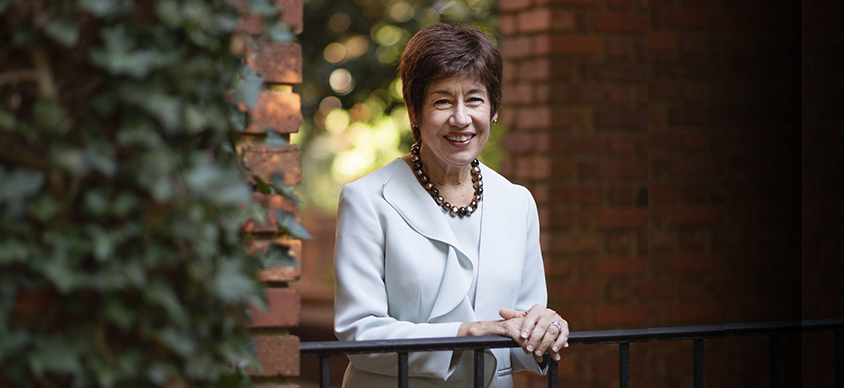Higher Cause
It was PSAT day for 16-year-old Pat Burgh, a high school junior living outside New Haven, Connecticut. Her No. 2 pencil in hand, she filled out a form that asked, among other questions, which academic degree she ultimately would like to earn. Bachelor's? Master's? Doctorate? Pat checked doctorate.
Decades later, as a former Seton Hall administrator, Pat recalls that simple gesture "clear as day," for it foreshadowed a lifelong love of learning and a particular commitment to higher education. Pat recently fortified that commitment with a generous gift to the Stetar-Finkelstein Fund, which supports the University's higher education doctoral program within the Department of Education Leadership, Management and Policy at the College of Education and Human Services.
"People like Joe Stetar and Marty Finkelstein were inspirational examples of scholars who made their teaching and mentoring just as important as their research and scholarship," Pat says. "They were teachers, and they found that to be just as important as any professional achievement in the field."
By the time Pat earned her master's degree in educational administration at Fairfield
University in Connecticut, where she began as an admissions counselor shortly after
graduating from Boston College, she was determined to chart a career course as a college
administrator.
Pat arrived at Seton Hall in 1986 as the dean of enrollment services, admissions,
and financial aid. While working as an administrator, she began the long process of
earning a doctoral degree in higher education administration, taking classes with
Finkelstein and Stetar, who would become her doctoral adviser, and learning firsthand
the profound influence the professors left on countless Seton Hall students.
"It was for me the manifestation of what higher education is about and what it can accomplish," she says.
During her 15 years in South Orange, Pat also served as associate vice president of
enrollment management and director of Seton Hall's image campaign. They were formative
years, during which she forged lifelong friendships and an abiding fidelity to the
University, particularly its mission to produce servant leaders.
Today she is an executive vice president at Graham-Pelton, a global fundraising management
consulting firm for nonprofit organizations. Pat says her doctoral experience, highlighted
by the mentorship she received from Stetar and Finkelstein, led directly to her donation
to their namesake fund.
It was also at Seton Hall that Pat met a rising young member of the science faculty named Steven House. They married in 2000, and both left Seton Hall a year later. Pat says their respective tenures at the University remain highlights of their college careers. Steven is now executive vice president at Elon University in North Carolina. In fact, Pat and Steven recently made another major donation, this time through their estate, by creating the Patricia Burgh House and Steven House Endowed Discretionary Fund for use by the Seton Hall president.
As Pat tells it, their recent gifts were not difficult decisions. "We have higher education administration in our blood, obviously," she says. "You add it all up — the impact of Seton Hall on our lives, the emotional ties, the proven need for an endowed unrestricted president's fund, the benefits of philanthropic planning — it was, quite frankly, a very rewarding decision to make."
At a Glance: Bequests
- Charitable bequests are made by naming Seton Hall as a beneficiary in your will or living trust. This type of gift does not affect your cash flow.
- Your assets remain in your control during your lifetime. You can modify your gift at any time should circumstances change.
- You can direct your gift to the area of Seton Hall's mission that is most meaningful to you.
- We can provide you with model bequest language and will work with you on the details.


